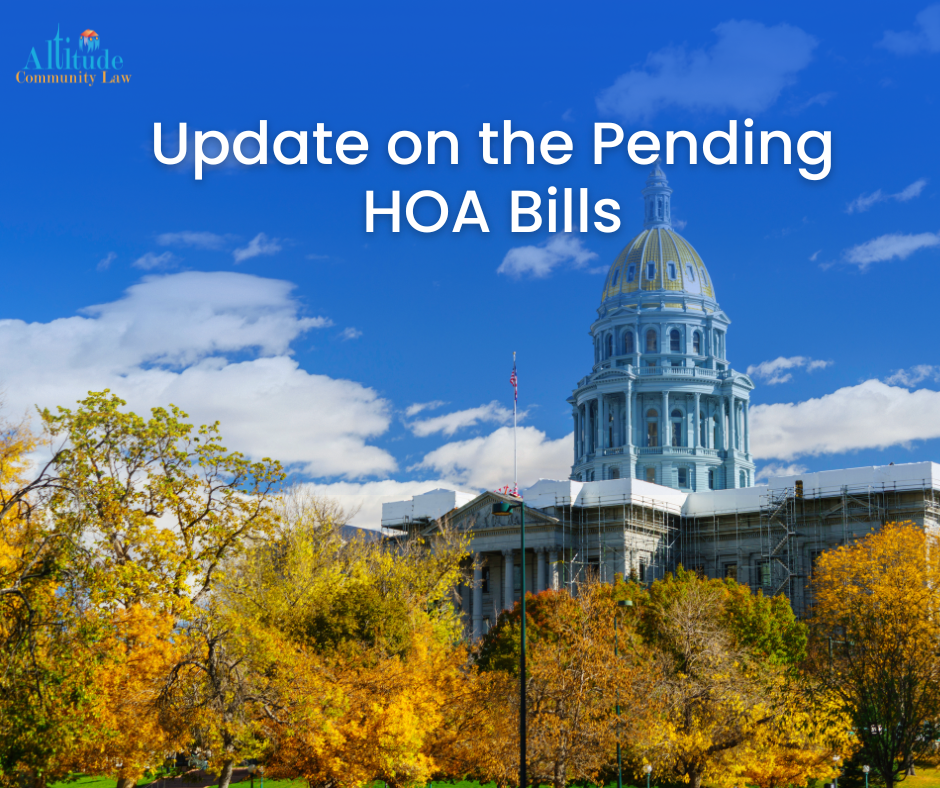
There are numerous bills that are pending this legislative session which affect community associations. I’ll go into just a few in this blog update:
- HB24-1108 Insurance – CONCERNING A STUDY OF THE MARKET FOR PROPERTY AND CASUALTY INSURANCE POLICIES ISSUED TO CERTAIN ENTITIES IN COLORADO.
In case you wondered if it’s only your association that is facing significant insurance premium increases, rest assured it’s not. In fact, the insurance market and its related conundrums have given rise to this bill, which requires the commissioner of insurance to conduct a study concerning the insurance marked for property and casualty policies, including those issued to common interest communities. The insurance commissioner is tasked with studying the considerations of implementing measures and programs to ensure availability of policies to, as well as long-term sustainability of such policies for, associations and owners. If passed, this bill would instruct the commissioner to prepare a report with the results of this study by January 1, 2026. As such, help may be on the way (but it’s still quite a way’s out on this one).
- HB24-1051 Towing Carrier Regulation – CONCERNING THE REGULATION OF BUSINESSES THAT OBTAIN A PERMIT FROM THE PUBLIC UTILITIES COMISSION TO TOW MOTOR VEHICLES.
Initially, you might not think that this bill has much to do with CICs since it primarily speaks to regulating such things as permit applications for and creating rules for towing carriers. However, tucked into the bill is provisions such as the prohibition of a towing carrier to patrol or monitor property to enforce parking restrictions on behalf of the property owner as well as a requirement that the towing carrier shall not perform a nonconsensual tow of a vehicle (other than an abandoned motor vehicle) from private property unless (among other things) the towing carrier has a contract with the property owner requiring the property owner to pay all fees for the nonconsensual tow, all fees for the required notifications, and all storage fees for the first thirty days the vehicle is stored as a result of the nonconsensual tow. This means that the association would be required to pay these fees, including the first thirty days of vehicle storage, for the vehicles it has towed from its property.
- HB24-1313 – Affordable Housing – CONCERNING MEASURES TO INCREASE THE AFFORDABILITY OF HOUSING IN TRANSIT-ORIENTED COMMUNITIES.
This bill would establish a category of local governing called a “transit-oriented community,” defined as a local government entirely within a metropolitan planning organization, with a population of 4,000 or more and containing at least 75 acres of certain transit related areas (commuter bus, commuter rail, light rail, public bus route). The bill would further mandate increased housing in such transit-oriented communities, setting housing opportunity goals for these communities wherein such housing would be regulated as affordable housing.
- HB24-1007 Prohibit Residential Occupancy Limits – CONCERNING RESIDENTIAL OCCUPANCY LIMITS.
Housing is the name of the game this session, and this is yet another bill concerned with housing availability. This bill seeks to prohibit local governments from limiting the number of people who may live together in a single dwelling; however the local governments would retain the authority to implement such limits based upon demonstrated health and safety standards.
- SB24-096 – Fenced Perimeter – CONCERNING THE USE OF FENCED PERIMETER SECURITY ALARM SYSTEMS.
If passed, this bill would prohibit a local government from enforcing any ordinance, resolution or building code provision that prohibits the use of a fenced perimeter security alarm system, or requires a permit for the installation or use of that system, imposes any requirements for the system that exceed or are otherwise inconsistent with the installation or operational requirements required for other alarm systems. The exception here would be for areas zoned exclusively for residential use – in which case, local government may still enforce such requirements.
- SB24-145 – Unlawful Restrictions in Land Records – CONCERNING THE ENACTMENT OF THE UNIFORM UNLAWFUL RESTRICTIONS IN LAND RECORDS ACT.
While current law deems restrictions in land records unlawful if such restrictions are based upon race, color, religion, national original, sex, familial status, disability or other personal characteristics, this bill would enact the Uniform Unlawful Restrictions in Land Records Act. Such Act would allow the owner of property that is subject to an unlawful restriction to submit an amendment to remove the unlawful restriction, but the bill also would allow the governing body of an association of owners to also amend a governing instrument to remove an unlawful restriction. In other words, if the association’s Declaration contains unlawful restrictions, the Board of Directors could request such amendment without the vote of the membership. Such Board could also act upon a member of the association who requests such amendment.
- While not specific to community associations, HB24-1267 Metro District CE – CONCERNING REQUIRING A METROPOLITAN DISTRICT ENGAGING IN COVENANT ENFORCEMENT ACTIVITIES, WOULD REQUIRE A METRO DISTRICT TO ADOPT AND FOLLOW A WRITTEN POLICY GOVERNING THE IMPOSITION AND COLLECTION OF FINES WHICH WOULD INCLUDE NOTICE REQUIREMENTS AND AN OPPORTUNITY FOR A HEARING ON THE ALLEGED VIOLATION PRIOR TO FINES BEING ISSUED. Additionally, the metro district would need to adopt a written policy regarding dispute resolution between the district and residents. The bill would also ensure that metro districts refrain from prohibiting certain uses and actions by district residents (such as displaying flags and signs, parking a vehicle in a driveway, using rain barrels or renewably energy generation devices or energy efficiency measures, etc). And finally, this bill would further prohibit a metro district from foreclosing on its lien based upon a resident’s balance that arose from amounts owed to the metro district as a result of a covenant violation or enforcement matter.
To stay up to date on daily/weekly changes to the proposed bill, bookmark our 2024 Legislative Tracker!
If you have any questions about any of these bills, please contact one of our Altitude attorneys at 303-432-9999 or email us at [email protected].